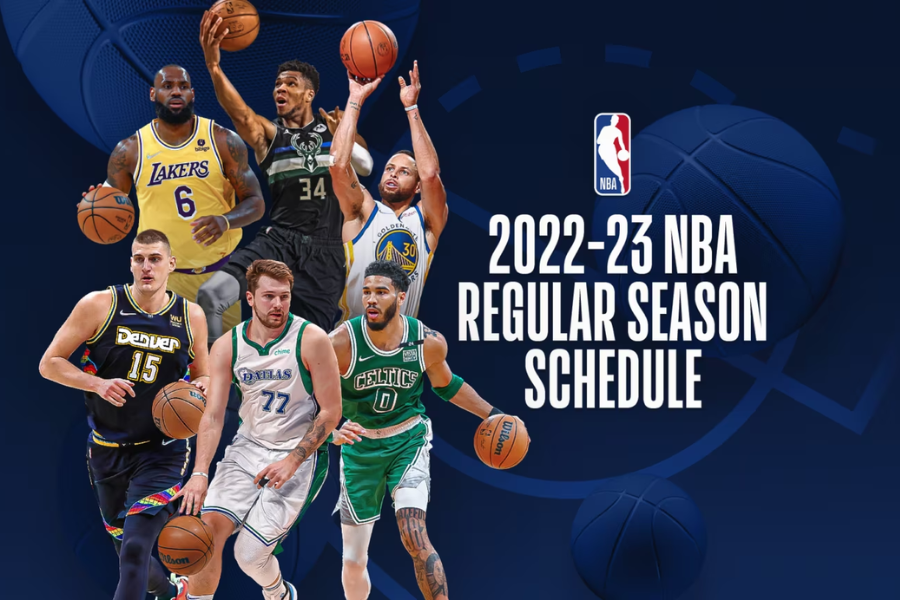Why Don’t NBA Games Start on Time? Here is The Answer
Many sports enthusiasts, especially NBA fans, often wonder: Why don’t NBA games start on time at the scheduled time? It seems like a plain ask, but deep digs show more. We’ve eyed key bits that shape this time pick.
In this article, we shed light on how the NBA picks game times. Whether you’re a dedicated NBA follower or just someone seeking clarity on the matter, we invite you to explore this topic with us.
Why Don’t NBA Games Start on Time? Factors Influence
NBA games often start later than the scheduled time primarily due to television broadcasts. The league, with its vast viewership both in the U.S. and globally, schedules games to fit prime time slots, ensuring maximum viewership. This delay accommodates player announcements, warm-ups, and broadcaster analyses.
How do television broadcasts impact the schedule?
Television broadcasts play a pivotal role in determining the start time of NBA games. Here’s why:
Prime Time Slots: Networks aim to broadcast games during prime time to maximize viewership. For instance, a game scheduled at 7 PM might start a bit later to ensure it captures the audience settling in after dinner.
Ad Revenue: More viewers mean more ad revenue. Delaying the start time slightly can lead to increased ad slots, which in turn boosts revenue for the broadcasting network.
Global Audience: The NBA has a vast international audience. To cater to fans in different time zones, games might be scheduled to accommodate maximum global viewership.
What part do pre-game ceremonies play?
Pre-game ceremonies are an indispensable portion of the NBA experience. They contribute to the overall atmosphere and excitement of basketball games. Here’s how they impact the start time:
Player Presentations: Sometime before the amusement starts, each player is presented, which can take a few minutes. Keep in mind the zapping presentation of Michael Jordan with the Chicago Bulls. Such minutes are famous and include the game’s allure.
National Song: The rendition of the national song of devotion is a staple in NBA recreations, and depending on the entertainer, it can change in length.
Special Ceremonies: Sometimes, there might be shirt retirements, grant introductions, or tributes that can amplify the pre-game term.
Average Time Taken by Pre-Game Ceremonies
| Ceremony Type | Average Duration (Minutes) |
|---|---|
| Player Introductions | 5-10 |
| National Anthem | 2-5 |
| Special Ceremonies | 5-15 |

Read more: How Long Is A High School Basketball Game?
Are commercial breaks and advertisements really necessary during matches?
TV Networks have found a goldmine in the pauses that frustrate fans waiting for the game to start. These moments aren’t just down time—they’re filled with strategically placed ads. Networks charge a premium for these slots, especially during highly anticipated games. The commercials you see are tailored for maximum impact, knowing they have a captive audience of sports enthusiasts just like you.
Let’s look at the numbers:
| Aspect | Details |
| Average Commercial Slot | 30-60 seconds |
| Prime-time Advertising | Up to 4 times the normal rate |
| Pre-game Commercials | 6-12 minutes |
Advertisers queue up to showcase their products during these windows. It’s not only about promoting their brands, but also about being associated with the excitement of live sports. And you can bet that the ads are not just filling time—they are part of a larger strategy to maximize revenue for broadcasters.
Remember, why NBA games don’t start on, but these advertising strategies are crucial for the economics of broadcasting sports events. They help networks cover the massive costs of acquiring the rights to air these games and, in turn, impact how you as a fan ultimately consume the sport.
How venue issues affect match start times?
Teams and arenas have a vested interest in making sure seats are filled. After all, a buzzing crowd amps up the atmosphere and adds energy to the game. But there’s more to it than just energy—it’s a big part of the revenue pie. That’s why start times might be adjusted to when fans are more likely to fill up those seats.
Schedules are crafted to maximize turnout. Have you ever noticed that games on weekdays tend to start later? It gives you time to get off work, grab a quick bite, and still catch the action from the opening toss. These slight delays are intended to ensure nobody’s rushing—or worse, skipping out on buying tickets because they can’t make it on time.
Were there any unforeseen events before the match that caused the delay?
When settling in for a game, you’re hyped up and ready for the action to start. But occasionally, your excitement is tempered by unexpected pauses—technical difficulties can be a real game spoiler. Regardless of the extensive preparations, glitches in the technology that brings the game to life, from the scoreboard to the shot clock, can cause delays. Unexpected incidents are inevitable.
How Does Prime Time Viewership Affect Game Scheduling?
The NBA, renowned for its thrilling matches and global appeal, has always been strategic about its game scheduling. A significant factor in this strategy revolves around prime time viewership. But why don’t NBA games start on time have anything to do with different US time zones?
Why is prime time crucial for NBA broadcasts?
Prime time is the golden window for television broadcasts. It’s the period when the greatest number of watchers are tuned in, making it a hotspot for advertisers and networks.
Maximized Viewership: The hours between 8 PM and 11 PM are when most individuals are domestic from work and are likely to observe TV. Broadcasting NBA games during this window ensures a larger audience.
Increased Advertisement Income: With more eyes on the screen, advertisers are willing to pay a premium for openings amid NBA recreations. This is a critical income stream for broadcasters.
Enhanced Fan Engagement: Prime time games often come with higher production values, special segments, and celebrity appearances. For instance, think about the halftime shows during significant games or playoffs – they’re events in themselves!
How do different U.S. time zones influence game start times?
The U.S., with its multiple time zones, presents a unique challenge for NBA game scheduling.
Coast-to-Coast Coverage: A game starting at 9 PM EST would start at 6 PM on the West Coast. To ensure maximum viewership across the country, the NBA might delay the start slightly.
Double-Headers: Often, there are two games broadcasted back-to-back. The NBA ensures that both games get prime-time coverage across different time zones.
Weekend Schedules: On weekends, the NBA might schedule games earlier to cater to a broader audience, considering people are available throughout the day.
How Do Other Professional Sports Compare in Start Times?
While the complexity of why don’t NBA games start on time is the focus of many, it’s essential to understand this in the broader context of professional sports. Do other leagues also grapple with similar challenges, or is this unique to the NBA?
Are delays unique to the NBA, or do other leagues experience them?
The NBA is not alone in its dance with start times. Other major leagues also face similar challenges.
NFL: The National Football League, with its Sunday games, often has a set kickoff time. However, the actual start might be delayed by a few minutes due to pre-game analyses and ceremonies, 5-10 minutes delay for prime time games.
MLB: Major League Baseball games, given their longer duration, generally start closer to the scheduled time. But, special events or ceremonies can sometimes push the first pitch back, 0-5 minutes, longer for special events.
NHL: The National Hockey League, much like the NBA, often factors in pre-game activities, which can delay puck drop, 5-10 minutes, especially for high-profile matchups.
What strategies do other sports use to manage broadcast schedules?
Different leagues have distinct strategies to ensure optimal viewership and fan engagement.
Fixed Slots: Take the NFL. They have set times on Sundays. Fans know when to watch, even if the start lags a bit.
Day Games: MLB, with many games in a year, opts for day play, more so on weekends. This way, they reach most fans, not just those up at night.
International Games: Some, like the Premier League in soccer, think of fans all over. The time games for those in Asia and the West too.
Why Don’t NBA Games Start on Time? Advantages and Disadvantages
NBA game start times spark much talk among fans and those who study the game. There’s good in a short wait before the game starts, but there are downs too. Let’s see both sides.
How do fans and viewers benefit from the delay?
There are several advantages to pushing the start time a bit:
Maximized Viewership: A small wait means fans, even those late from jobs, catch the game’s start. It’s to get all eyes on the game.
Enhanced Pre-Game Experience: The wait gives full pre-game chats and talks. Think of times when big names like Shaq and Barkley talk game plans. Such bits boost the joy of watching.
Flexibility for Last-Minute Arrivals: Those who come to watch live get some slack if they face jams or long lines.
Are there any drawbacks to not starting games on time?
While there are benefits, there are also some cons to consider:
Inconsistent Start Times: For fans who schedule their evenings around games, inconsistent start times can be frustrating. A 7 PM tag means a 7 PM start for them.
Late Endings: Especially for East Coast fans, a delayed start can mean the game ends quite late, which can be problematic for those with early commitments the next day.
Perceived Unprofessionalism: Some fans feel that not sticking to the scheduled time can come off as unprofessional or disrespectful to the audience.
How Has the NBA Addressed Concerns About Start Times?
The NBA’s approach to why don’t NBA games start on time has become a hot topic among fans, analysts, and even NBA players. Recognizing the concerns, the NBA has taken steps to address them. But what exactly has the league said, and what changes have been made?
Are there any official statements or policies from the NBA?
The NBA, being a fan-centric league, has always been open to feedback. Over the years, they’ve acknowledged the concerns regarding start times.
Fan Feedback: The NBA has conducted surveys and feedback sessions, gathering opinions directly from the fans about start times.
Official Statements: While the NBA hasn’t released a blanket policy on start times, they’ve often reiterated their commitment to providing the best viewing experience. For instance, in response to concerns about late playoff games, the league emphasized the balance they try to strike between prime-time viewership and fan convenience.
What changes, if any, have been implemented in recent years?
The NBA, in collaboration with its broadcasting partners, has made several adjustments:
Earlier Weekend Games: Recognizing the flexibility of fans on weekends, some games, especially on Sundays, have been scheduled earlier to cater to families and international audiences.
Staggered Playoff Schedules: To ensure maximum viewership for marquee matchups, the NBA has occasionally staggered playoff game start times, ensuring fans can catch multiple games without overlap.
Consistent National Broadcast Times: For nationally televised games, the NBA has aimed for more consistency, ensuring fans have a general idea of when to tune in.
Conclusion
There are many reasons why don’t NBA games don’t start on time, from broadcast strategy to player pregame rituals. Understanding the reasons can make those extra minutes a little less confusing. So the other time you’re holding up for the buzzer to blow and pondering why the amusement hasn’t begun however, keep in mind that it’s all portion of the greater picture. Your tolerance will be remunerated. Fair sit back, unwind, and get ready to appreciate the diversion at its best.
